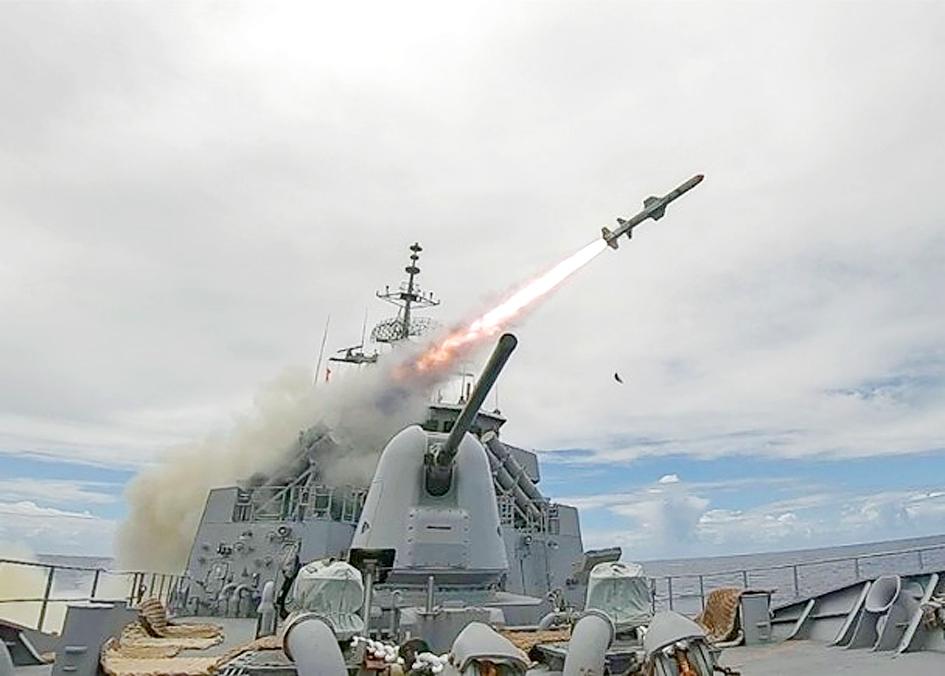The government yesterday thanked Washington for another proposed arms sales package to strengthen the nation’s defense capabilities.
“Taiwan’s government thanks the US government for once again providing important defensive weapons in the wake of last week’s announcement of a three-part arms sales package,” Presidential Office spokesman Xavier Chang (張惇涵) said in a statement yesterday.
“This sale once again constitutes concrete action by the US government to fulfill its security commitments under the ‘six assurances’ and the Taiwan Relations Act, and also demonstrates that the US government considers assisting Taiwan to strengthen our self-

Photo: Chen Cheng-liang, Taipei Times
defense capabilities a matter of great importance,” he said.
In the face of China’s military expansionism and provocation, Taiwan will further modernize its defense capabilities and upgrade its asymmetric combat capabilities, in a bid to maintain regional peace and stability, it said.
The latest package includes up to 100 Harpoon Coastal Defense Systems and related equipment for an estimated cost of US$2.37 billion, the Pentagon’s Defense Security Cooperation Agency said in a news release.
Also included are 400 RGM-84L-4 Harpoon Block II Surface- launched Missiles, four RTM-84L-4 Harpoon Block II Exercise Missiles, 411 containers, 100 Harpoon Coastal Defense System launcher transporter units, 25 radar trucks and other related logistics services and support, it said.
The agency has delivered the required certification notifying the US Congress of the possible sale, it added.
The proposed sale would improve the recipient’s capability to meet current and future threats by providing a flexible solution to augment existing surface and air defenses, but would not alter the basic military balance in the region, it said.
The US Department of State’s Bureau of Political Military Affairs also announced the sale on Twitter.
The notice came just five days after Washington announced the possible sale of a US$1.8 billion package that includes 11 High Mobility Artillery Rocket Systems M142 launchers and 135 AGM-84H Standoff Land Attack Missile Expanded Response Missiles, as well as surveillance and reconnaissance sensors to be mounted on aircraft.
The US has normalized its arms sales to Taiwan and reviewed Taiwan’s purchase proposals upon request, rather than holding and approving accumulated proposals all at once, Democratic Progressive Party Legislator Wang Ting-yu (王定宇) wrote on Facebook.
The weapons provided by the US also feature long-range and precision combat capabilities, and can be mounted on existing systems, he added.
Following Washington’s announcement last week, Chinese Ministry of Foreign Affairs spokesman Zhao Lijian (趙立堅) on Monday said that Beijing would impose sanctions on Lockheed Martin Corp, a Boeing Co defense unit, Raytheon Technologies Corp and other US companies involved in the US’ arms sales to Taiwan.
China would take “necessary measures” to safeguard national sovereignty and security interests if the US does not drop its arms sale plans, ministry spokesman Wang Wenbin (汪文斌) said yesterday in a China Central Television news report.

CHAOS: Iranians took to the streets playing celebratory music after reports of Khamenei’s death on Saturday, while mourners also gathered in Tehran yesterday Iranian Supreme Leader Ayatollah Ali Khamenei was killed in a major attack on Iran launched by Israel and the US, throwing the future of the Islamic republic into doubt and raising the risk of regional instability. Iranian state television and the state-run IRNA news agency announced the 86-year-old’s death early yesterday. US President Donald Trump said it gave Iranians their “greatest chance” to “take back” their country. The announcements came after a joint US and Israeli aerial bombardment that targeted Iranian military and governmental sites. Trump said the “heavy and pinpoint bombing” would continue through the week or as long

TRUST: The KMT said it respected the US’ timing and considerations, and hoped it would continue to honor its commitments to helping Taiwan bolster its defenses and deterrence US President Donald Trump is delaying a multibillion-dollar arms sale to Taiwan to ensure his visit to Beijing is successful, a New York Times report said. The weapons sales package has stalled in the US Department of State, the report said, citing US officials it did not identify. The White House has told agencies not to push forward ahead of Trump’s meeting with Chinese President Xi Jinping (習近平), it said. The two last month held a phone call to discuss trade and geopolitical flashpoints ahead of the summit. Xi raised the Taiwan issue and urged the US to handle arms sales to

BIG SPENDERS: Foreign investors bought the most Taiwan equities since 2005, signaling confidence that an AI boom would continue to benefit chipmakers Taiwan Semiconductor Manufacturing Co’s (TSMC, 台積電) market capitalization swelled to US$2 trillion for the first time following a 4.25 percent rally in its American depositary receipts (ADR) overnight, putting the world’s biggest contract chipmaker sixth on the list of the world’s biggest companies by market capitalization, just behind Amazon.com Inc. The site CompaniesMarketcap.com ranked TSMC ahead of Saudi Aramco and Meta Platforms Inc. The Taiwanese company’s ADRs on Tuesday surged to US$385.75 on the New York Stock Exchange, as strong demand for artificial intelligence (AI) applications led to chip supply constraints and boost revenue growth to record-breaking levels. Each TSMC ADR represents

State-run CPC Corp, Taiwan (CPC, 台灣中油) yesterday said that it had confirmed on Saturday night with its liquefied natural gas (LNG) and crude oil suppliers that shipments are proceeding as scheduled and that domestic supplies remain unaffected. The CPC yesterday announced the gasoline and diesel prices will rise by NT$0.2 and NT$0.4 per liter, respectively, starting Monday, citing Middle East tensions and blizzards in the eastern United States. CPC also iterated it has been reducing the proportion of crude oil imports from the Middle East and diversifying its supply sources in the past few years in response to geopolitical risks, expanding